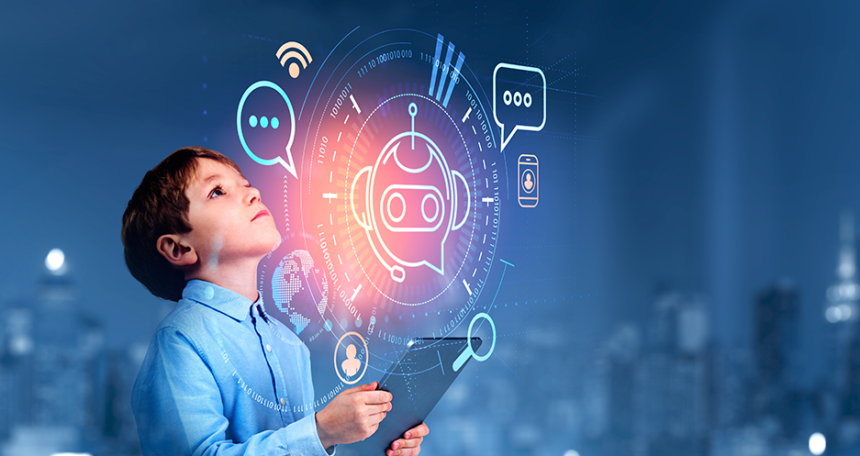In today’s fast-paced digital era, artificial intelligence (AI) is no longer the stuff of science fiction but a pervasive reality shaping various facets of our lives, including how we parent. From virtual assistants that help manage household chores to educational apps that personalize learning experiences, AI has woven itself into the fabric of modern parenting. However, while these technological advancements offer remarkable benefits, they also present unprecedented challenges that parents must navigate carefully.
One of the most significant advantages AI brings to parenting is the ability to streamline daily tasks. Smart home devices can handle everything from regulating the thermostat to managing grocery lists, freeing up precious time for parents to focus on their children. Moreover, AI-driven educational tools can cater to a child’s unique learning style and pace, providing tailored support that was previously unimaginable. These innovations can enhance a child’s educational journey, making learning more engaging and effective.
However, the integration of AI into our lives also raises critical concerns, particularly regarding privacy, screen time, and the potential for over-reliance on technology. As AI systems collect vast amounts of data to function effectively, questions about data security and privacy are paramount. Parents must be vigilant about the information these devices collect and how it is used, ensuring that their family’s privacy is not compromised.
Screen time is another contentious issue. While educational apps and AI-driven games can be beneficial, there is a fine line between productive use and digital dependency. Excessive screen time can have detrimental effects on a child’s physical and mental health, leading to issues such as impaired social skills, sleep disturbances, and reduced physical activity. Parents must strike a balance, encouraging outdoor activities and face-to-face interactions to foster a well-rounded upbringing.
The potential for over-reliance on AI is another concern. While AI can assist with many tasks, it should not replace human interaction and intuition in parenting. Machines cannot replicate the emotional intelligence, empathy, and moral guidance that parents provide. It is crucial to remember that AI is a tool to aid parenting, not a substitute for the human touch that is fundamental to a child’s development.
As AI technology evolves, it is essential for parents to stay informed and adaptable. This means continuously educating themselves about new technologies and their implications, setting appropriate boundaries, and being proactive in teaching their children about responsible technology use. Parents should also advocate for ethical standards in AI development, pushing for transparency and accountability from tech companies to ensure that these tools are designed with the best interests of families in mind.
Moreover, today’s parents are navigating an uncharted landscape, trying to strike a balance between harnessing the benefits of technology and mitigating its potential downsides. In the digital era, children are exposed to a vast universe of information, which can be both a blessing and a curse. Parents must guide their children through this digital maze, teaching them to discern the good from the bad and the truth from the fallacy.
This task has never been more critical, as the rise in misinformation and online bullying has made the internet a potential minefield for the young and impressionable. Effective parenting today requires a firm grasp of technology. Parents need to understand the platforms their children are using, the content they are consuming, and the people they are interacting with. Internet safety must be a top priority, with parents teaching their children about the importance of protecting personal information, the signs of online predators, and the right way to behave in the digital world. But technology is just one facet of modern parenting.
Today’s parents are also grappling with new societal norms and expectations. The traditional roles of mother and father are evolving, with more emphasis on shared parenting responsibilities. This shift is a step forward but it requires parents to adapt and adjust to these changes, all while maintaining consistency in their child’s life. In this ever-changing landscape, some timeless parenting principles remain. Communication, for instance, is still the bedrock of effective parenting. Open, honest, and frequent communication fosters trust and understanding.
Encouraging dialogue about feelings, struggles, and dreams can help children navigate their emotions and challenges. Similarly, setting boundaries and expectations continue to be crucial. Children thrive on structure, and knowing what is expected of them gives them a sense of security. These boundaries should evolve as the child grows, fostering independence and responsibility. Furthermore, modern parents must not forget the power of leading by example. Children learn more from what they see than what they are told. By embodying virtues such as kindness, honesty, resilience, and respect, parents can influence their children’s behavior more than any lecture could.
Many child psychologists are of the opinion that parents must acknowledge and respect their children as individuals. Each child is unique, with their own strengths and weaknesses, interests and dislikes, dreams and fears. Recognizing and nurturing this individuality can help children grow into confident, capable adults. Effective parenting in the modern world requires a blend of understanding new technology, adapting to societal changes, and adhering to timeless principles. It may seem a daunting task, but it’s important to remember that no parent is perfect. It’s the willingness to learn, adapt, and grow with your child that truly makes a difference. After all, the goal of parenting is not to produce perfect children, but to nurture them into well-rounded, responsible, and happy individuals.
In conclusion, parenting in the age of artificial intelligence presents a complex landscape of opportunities and challenges. Embracing the benefits of AI can undoubtedly make parenting more manageable and enriching. However, it is imperative for parents to remain vigilant, informed, and proactive, ensuring that technology serves to enhance, rather than hinder, their child’s development. By finding the right balance, we can navigate this new frontier with confidence, raising a generation that is both technologically savvy and deeply connected to human values.
(Author is PhD in Child Psychology and columnist)










